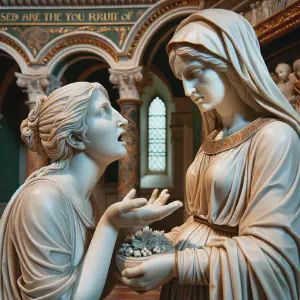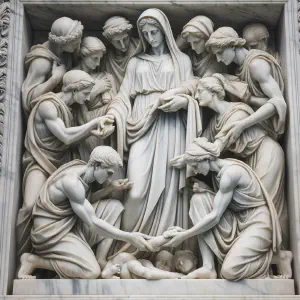The Joyful Encounter



As Mary and Elizabeth share their experiences, the words of the prophets come to life around them. The love of a gazelle-like lover leaping across the hills in the Song of Songs mirrors the joyous leap of the child in Elizabeth’s womb. The promise of a mighty savior rejoicing over His people, as foretold by Zephaniah, finds a tender echo in the encounter at Elizabeth’s home. In these moments, the tapestry of God’s word is woven together, each thread a testament to His enduring love and the fulfillment of His promises.
Five Questions
What is the significance of the Song of Songs in relation to the story of Mary and Elizabeth?
The Song of Songs, often interpreted as an allegory of God’s love for His people, parallels the deep spiritual connection in the story of Mary and Elizabeth. Just as the lover in the Song of Songs rejoices and cherishes his beloved, the encounter between Mary and Elizabeth reflects a divine rejoicing over the fulfillment of God’s promise through the birth of Jesus and John.
How does Zephaniah’s prophecy relate to the joy expressed in Mary and Elizabeth’s meeting?
Zephaniah’s prophecy speaks of God being in the midst of Israel, bringing joy and removing fear. This directly mirrors the joy and absence of fear in Mary and Elizabeth’s meeting, as they celebrate the imminent arrival of the Lord and Savior. Their encounter symbolizes the fulfillment of the prophecy, with Jesus’ coming representing God’s presence among His people.
In what way does the Psalm reflect the themes of trust and joy found in the Gospel story?
The Psalm emphasizes trust in the Lord and rejoicing in His holy name, themes that are vividly present in the Gospel story. Mary and Elizabeth’s faith and joyous acceptance of God’s will are examples of the deep trust and rejoicing in God’s plan, as expressed in the Psalm. Their unwavering belief in the Lord’s promise mirrors the Psalm’s call to trust and find joy in God.
Why is Elizabeth’s declaration of Mary’s blessedness important in the context of these readings?
Elizabeth’s declaration of Mary as “blessed among women” is crucial as it acknowledges Mary’s unique role in God’s salvation plan. This recognition links to the overarching themes of the readings, where God’s love and promises are fulfilled in extraordinary ways. Elizabeth’s words highlight the significance of Mary’s faith and her role as the mother of the Lord, central to the Christian belief in salvation.
How do all these readings together convey a message about God’s plan for salvation?
These readings collectively illustrate the intricacy and beauty of God’s plan for salvation. The Song of Songs shows the depth of God’s love, Zephaniah speaks of joy and deliverance, the Psalm emphasizes trust and rejoicing in the Lord, and the Gospel story of Mary and Elizabeth celebrates the fulfillment of God’s promises. Together, they depict a tapestry of divine love, faith, and salvation, culminating in the coming of Jesus Christ.
Bible Study
Song of Songs 2:8-14
Hark! my lover–here he comes
springing across the mountains,
leaping across the hills.
My lover is like a gazelle
or a young stag.
Here he stands behind our wall,
gazing through the windows,
peering through the lattices.
My lover speaks; he says to me,
“Arise, my beloved, my dove, my beautiful one,
and come!
“For see, the winter is past,
the rains are over and gone.
The flowers appear on the earth,
the time of pruning the vines has come,
and the song of the dove is heard in our land.
The fig tree puts forth its figs,
and the vines, in bloom, give forth fragrance.
Arise, my beloved, my beautiful one,
and come!
“O my dove in the clefts of the rock,
in the secret recesses of the cliff,
Let me see you,
let me hear your voice,
For your voice is sweet,
and you are lovely.”
This passage, often interpreted allegorically in Catholic tradition, represents God’s love for His people. The characters, a lover and his beloved, symbolize Christ and the Church or the soul. The lover’s desire to see and hear the beloved reflects God’s yearning for a relationship with humanity. This aligns with Catholic values of divine love and the soul’s longing for union with God, resonating with teachings on grace and spiritual communion.
Zephaniah 3:14-18a
Shout for joy, O daughter Zion!
Sing joyfully, O Israel!
Be glad and exult with all your heart,
O daughter Jerusalem!
The LORD has removed the judgment against you,
he has turned away your enemies;
The King of Israel, the LORD, is in your midst,
you have no further misfortune to fear.
On that day, it shall be said to Jerusalem:
Fear not, O Zion, be not discouraged!
The LORD, your God, is in your midst,
a mighty savior;
He will rejoice over you with gladness,
and renew you in his love,
He will sing joyfully because of you,
as one sings at festivals.
In this prophecy, Zephaniah speaks of God’s presence bringing joy and salvation to Israel. The ‘King of Israel, the Lord’, central in this passage, symbolizes God’s role as protector and savior. This aligns with Catholic teachings on God’s mercy and the role of divine providence. It underscores themes of hope, redemption, and the joy found in God’s love, resonating with the acts of mercy and the concept of grace.
Psalm 33:2-3, 11-12, 20-21
R. (1a; 3a) Exult, you just, in the Lord! Sing to him a new song.
Give thanks to the LORD on the harp;
with the ten-stringed lyre chant his praises.
Sing to him a new song;
pluck the strings skillfully, with shouts of gladness.
R. Exult, you just, in the Lord! Sing to him a new song.
But the plan of the LORD stands forever;
the design of his heart, through all generations.
Blessed the nation whose God is the LORD,
the people he has chosen for his own inheritance.
R. Exult, you just, in the Lord! Sing to him a new song.
Our soul waits for the LORD,
who is our help and our shield,
For in him our hearts rejoice;
in his holy name we trust.
R. Exult, you just, in the Lord! Sing to him a new song.
This Psalm celebrates God’s faithfulness and righteousness, urging the righteous to praise God with music. It emphasizes God’s eternal plan and the blessedness of those who trust in Him. This reflects Catholic values of trust in divine providence and the importance of worship. The Psalm aligns with the teachings on the virtue of hope and the role of grace in guiding and protecting believers, resonating with themes in the catechisms about faith and reliance on God.
Luke 1:39-45
Mary set out in those days
and traveled to the hill country in haste
to a town of Judah,
where she entered the house of Zechariah
and greeted Elizabeth.
When Elizabeth heard Mary’s greeting,
the infant leaped in her womb,
and Elizabeth, filled with the Holy Spirit,
cried out in a loud voice and said,
“Most blessed are you among women,
and blessed is the fruit of your womb.
And how does this happen to me,
that the mother of my Lord should come to me?
For at the moment the sound of your greeting reached my ears,
the infant in my womb leaped for joy.
Blessed are you who believed
that what was spoken to you by the Lord
would be fulfilled.”
This passage describes the Visitation, where Mary, carrying Jesus, visits Elizabeth, who is pregnant with John the Baptist. Mary and Elizabeth represent faithfulness and obedience to God’s will. Elizabeth’s recognition of Mary’s blessedness and the leaping of John in her womb highlight the sanctity of life and the presence of Jesus as Savior. This aligns with Catholic doctrines on the Incarnation, sanctity of life, and Mary’s role in salvation history, embodying the virtues of faith, hope, and love.
Lessons
These sacred readings invite us to reflect on the profound joy and hope found in God’s promises. The Song of Songs celebrates divine love and yearning, symbolizing the deep relationship between God and His people. Zephaniah speaks of God’s presence as a source of joy and security, removing fear and bringing salvation. The Psalm emphasizes trust in the Lord, who is our help and shield, encouraging us to rejoice in His name. Finally, the Gospel of Luke recounts the Visitation, where Elizabeth and Mary, both bearing miraculous children, rejoice in the fulfillment of God’s promises. These passages collectively teach us the importance of faith, the joy of salvation, and the power of God’s love in our lives.
Meditation Prayer


